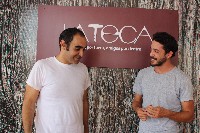The Hungry Fisherman: La Teca's Commitment To Authenticity

The fisherman was hungry. It had been sixteen hours since he left Gandia, a sleepy port town south of Valencia. The sea had been rough, and the sun, which had beat down hard in his small, lonely panga, was sinking like a rock into the water. He had made his way through the Ibiza Channel and into the Balearic Islands where the blue-fins and dorados roam. In a small pan on an even smaller burner in the stern of his rusty boat, the fisherman sautéed mussels, cuttlefish and shrimp (which were caught that morning for bait). To the seafood, he added a sofrito of garlic, onions, peppers, tomatoes and olive oil. The aroma, as it mixed in his nose with the salty breeze, made his stomach growl with anticipation. Then he added short, thin noodles and a spoonful of fish stock. He stirred and stirred and stirred, adding more stock as needed. And beneath the ancient stars, with two lines cast out over the lip of his skiff, he ate the same dish his father ate under the very same stars. The dish is Valencian Fideuà.
As an ex-chef who now writes for his living, the above narrative is unbelievably inspiring to me but not nearly as inspiring as it is to Juan Capel, Executive Chef of La Teca. The Coronado restaurant is rapidly making a name for itself in the culinary circles of Panama and after sitting down with Juan for an afternoon of chit-chat and chow, it's easy to see why. La Teca, which means "teak" in the Catalan language, is committed to serving up unerring versions of Catalonian, Valencian and Alacanti classics. One of which, you guessed it, is traditional Fideuà.
"Food is the best way to make new relationships with people and to keep relationships with people," Juan told me. "In Spain, whenever you are with other people, there is always food around. Always." And just as I began to wonder where our 'food' was, out came a sizzling hot pan of Valencian Fideuà. When I saw it presented, it became very clear that Fideuà is prepared in the same style as Paella, except the short-grain Calasparra rice has been swapped out for Vermicelli style noodles. Juan's onto something. As soon as the noodles arrived our conversation seemed to flow exponentially better and we went all the way back to the beginning.
At fourteen, Juan knew he wanted to cook. At sixteen, he started as a waiter in a local restaurant. At eighteen, he started as a line cook at El Celler De Matadepera in Barcelona where he eventually became Head Chef of Catering and then, Chef Du Partie of the entire restaurant by the time we was twenty-three. Somehow, during all this, he found the time and energy to graduate from a five-year hospitality course at one of Spain's more prestigious culinary institutes.
For twenty-three-year-old Juan Capel, the dream of every bright-eyed, over-starched young chef came true: he rolled up his trusty knife kit and went abroad. He ended up cooking at the Radisson Hotel In Glasgow where he was able to refine not only his chiffonade but his English as well. At twenty-five, Juan made his way back to his homeland, eventually settling in Barcelona.
As if struck with a quarter-life crisis, Juan made a drastic move that I can most certainly relate to: he hung up his chef whites and called it quits (about the same age I was when I quit the industry). For four, what I can only imagine were long, uninspiring years, he dawned a suit and tie and hashed it out in the big bad world of European finance and consulting. "I just needed a change, I guess," Juan claims.
Let me tell you: the culinary industry is not exactly a fast-track to a life of obscene wealth and opulence. In fact, it's quite the opposite. One dog day after another. Deep cuts. Searing burns. Unpaid overtime. Throbbing feet. Working on Valentine's Day. More unpaid overtime. Some verbal abuse from superiors. Inhaling cancer cells off the charring grill. Even more unpaid overtime. The only remote comfort being a mid-day buzz off some low-end charity booze from the bartender. Windsor knots, business lunches at Benihana and number-crunching suddenly sounds doable in comparison.
But professional cooking, at best, is a love-hate relationship and it wasn't long before Juan got the itch again. After taking a year off to "just hang out", Juan, now thirty-two, made his reentry into the garish world of cooking as a restaurant and kitchen consultant — every over-worked and jaded chef's dream come true. It's this consulting work that has brought him to Panama. He isn't a permanent fixture at La Teca, in fact, his role is like that of training wheels: once the place can run on it's own without any hiccups, he'll be off. Though he will have left in his wake an unwavering fidelity to culinary authenticity and a lasting respect for Catalan tradition.
Go to La Teca. Order the Valencian Fideuà. At first bite, if you don't immediately picture our hungry old fisherman in his rusted panga bobbing up and down in the Balearic sea beneath a thousand twinkling giants while he shovels forkfuls of noodles into his mouth, well, the Fideuà is on me.

~
Jeff Campagna is a freelance writer and journalist. He is a regular contributor for Arc, Digital Journal, Sabotage Times, Digital Americana, Thought Catalog, Swaave Magazine
